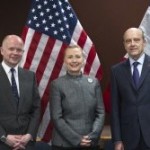Both sides sounded optimistic following Saturday’s meeting between the representatives of the international powers and Iran over the latter’s nuclear program, with another meeting set for next month. Israel, meanwhile, was displeased by what sounded like an uneventful outcome of the discussion.
The United States, the United Kingdom, France, Russia, China and Germany—collectively the P5+1—agreed with Iran to meet again on May 23 in Baghdad, Iraq. The West was encouraged by the content of Saturday’s talk, with European Union foreign policy chief Catharine Ashton saying the meeting was “constructive and useful.”
In a statement released by Ashton’s office, who is the main representative for the P5+1 in the talks with Iran, the EU diplomat said, “We want now to move to a sustained process of serious dialogue, where we can take urgent practical steps to build confidence and lead on to compliance by Iran with all its international obligations. In our efforts to do so, we will be guided by the principle of the step-by-step approach and reciprocity.”
The hint in Ashton’s comments is that the West is taking it slow, but is open to easing up sanctions in return for Iranian concessions on their nuclear program. It remains to be seen if that will occur.
Iran, meanwhile, sounded positive about the meeting as well. Iranian negotiator Saeed Jalili called the talks “progressive,” according to the Iranian Fars News Agency. “The opposite side had entered the talks with a positive attitude towards cooperation, and I believe that Mrs. Ashton’s role is remarkable” in that sense, Jalili was quoted by Fars as telling reporters.
The Americans were also sounding optimistic about Saturday’s talks. US Deputy National Security Advisor for Strategic Communication Ben Rhodes said later that day it was the White House’s understanding that there was a “constructive atmosphere, that the Iranians came to the table and engaged in a discussion about their nuclear program.”
Rhodes, in comments to reporters posted on the White House website, said the May follow-up meeting “is an additional positive sign that there is room to negotiate and have additional discussions about how Iran can live up to its obligations,” although he noted Iran will have to take confidence-building steps.
Israel’s Dissenting Voice
Israel was dismayed by the result, with Prime Minister Benjamin Netanyahu sounding particularly disappointed by the timeline. “My initial impression is that Iran has been given a ‘freebie,’” Netanyahu was quoted by his office as saying. “It has got five weeks to continue enrichment without any limitation, any inhibition.”
The Israeli leader reiterated the demands he feels should be placed on Iran, including calling for the removal of an underground nuclear enrichment plant Tehran has been setting up. Iran has repeatedly claimed their nuclear program and fuel enrichment is peaceful, but the International Atomic Energy Agency (IAEA) has highlighted concerns by the West over the lack of Iranian transparency and Iran’s research into devices used for nuclear weapons.
“I think Iran should take immediate steps to stop all enrichment, take out all enrichment material and dismantle the nuclear facility in Qom,” said Netanyahu. “I believe that the world’s greatest practitioner of terrorism must not have the opportunity to develop atomic bombs.”
Representatives from the P5+1 and Iran are set for “technical meetings” prior to the Baghdad full meeting, according to the US. Fars reported that Jalili and Ashton’s deputies are expected to draft a mutual cooperation arrangement before the May 23 meeting.
However, despite the similar sounds of optimism from the US and Iran, the expectations on what come next are very different. Rhodes was quoted as noting the US and Israel share “concern” on Iran’s nuclear program.
“There is a time and space that exists now for diplomacy but it’s not unlimited… We want to see concrete steps taken by the Iranians to demonstrate that their program is peaceful. We’ve indicated, along with the P5-plus-1, that we’d be open to a step-by-step process in reciprocal action if the Iranians demonstrate that seriousness.”
Iran, meanwhile, did not sound open to much compromise on a key demand of the West, at least not publicly.
Fars reported that Jalili dismissed the prospect of suspending their 20-percent uranium enrichment. The Iranians claim it is for medical research, but the West has expressed concerns about the quantity exceeding civilian use, as well as the fact that it is a significant step towards the 90-percent enrichment needed for nuclear weapons.
“Suspending Iran’s nuclear activities in return for the removal of sanctions is a literature which belongs to the past,” said Jalili.
(By Joshua Spurlock, www.themideastupdate.com, April 15, 2012)

